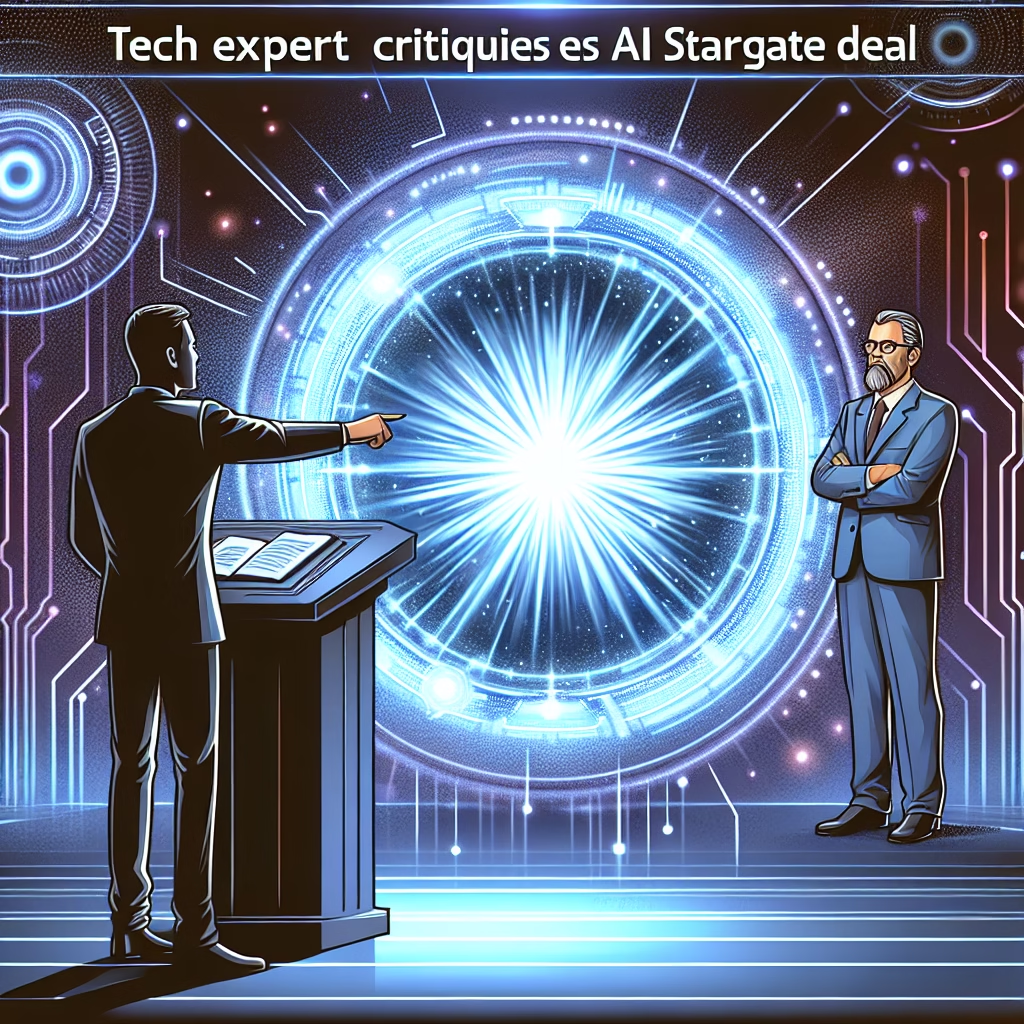Elon Musk Criticizes New AI ‘Stargate’ Deal Backed by Tech Giants: Here’s What You Need to Know
In a move that has once again placed Elon Musk at the center of a highly debated topic, the billionaire entrepreneur has spoken out against a new artificial intelligence (AI) project called “Stargate.” Backed by prominent tech companies, the project aims to push the boundaries of AI research and development. Musk, however, has raised concerns, calling attention to potential risks and ethical dilemmas surrounding the initiative.
This blog will delve into the details of the AI ‘Stargate’ project, Musk’s criticisms, and what it could mean for the rapidly evolving tech landscape. Whether you’re an AI enthusiast or a casual observer of Musk’s outspoken views, here’s everything you need to know.
What Is the AI ‘Stargate’ Project?
The ‘Stargate’ initiative, which has now caught Musk’s attention, is a collaborative venture between some of the world’s biggest tech companies. According to reports, it is designed to accelerate advancements in artificial intelligence while exploring new technologies for global applications. The project’s name, seemingly inspired by science fiction, reflects the ambition of its creators: to open new ‘gateways’ in human knowledge and innovation.
Key Goals of the ‘Stargate’ Project
- Develop powerful AI systems: The initiative aims to create cutting-edge AI models that surpass current capabilities.
- Open-source contribution: Stargate’s backers have promised to release a portion of their research for public benefit.
- Global challenges: The project intends to tackle pressing challenges such as climate change, healthcare disparities, and education gaps.
Supporters of the initiative have cited the potential to revolutionize industries, improve efficiency, and address some of humanity’s most significant issues. However, not everyone is convinced the project will be the unmitigated good it promises to be—especially Elon Musk.
Why Is Elon Musk Criticizing Stargate?
Elon Musk, the founder of Tesla, SpaceX, X (formerly Twitter), and an outspoken voice in AI ethics, has long expressed concerns about the unbridled development of artificial intelligence. Calling it a potential “existential threat,” Musk believes that AI development must be approached with extreme caution. His criticism of the Stargate project revolves around several key points:
1. Lack of Sufficient Regulation
Musk has often emphasized the need for strong regulatory oversight in the development of AI systems. He has warned in the past that tech projects driven primarily by profit motives could result in unintended consequences. Stargate, backed by for-profit corporations, appears to be no exception, according to him.
2. Risk of Misuse
The ‘Stargate’ project’s scale and ambition raise questions about who will wield the newfound power and capability of these AI systems. Musk has suggested that such advanced technology could easily be misused, either by corporations prioritizing profit over ethics or by malicious actors exploiting vulnerabilities.
3. ‘Science Fiction Becoming Reality’
The name ‘Stargate’ itself seems to reinforce an idea that Musk has repeatedly warned about: the line between science fiction and reality is growing thinner. While the project promises incredible breakthroughs, Musk’s concerns imply that “playing god” with technology like this could have unforeseen and catastrophic consequences.
Tech Giants’ Defense: Why They Think Stargate Will Work
Despite Musk’s criticism, the companies involved in Stargate remain confident in their vision. They believe the initiative is a step in the right direction for AI research, offering the following counterarguments:
- Transparency: Stargate’s backers argue that their commitment to open-source research ensures greater scrutiny and collaboration, minimizing ethical concerns.
- Global Benefit: They highlight the project’s emphasis on solving pressing international issues, suggesting that such technology could ultimately be a force for good.
- Industry Growth: Proponents suggest that Stargate will boost innovation, competition, and beneficial advancements in AI fields like medical research, autonomous technology, and sustainability.
Notably, the supporters have also invited partnerships with ethical oversight committees to ensure responsible progress—a small nod to addressing criticisms like Musk’s.
What’s at Stake? The Broader Implications of Stargate
The Stargate debate underscores broader concerns about AI, including its rapid growth, risks of misuse, and accessibility. Musk’s vocal opposition—not unlike his earlier endeavors to develop more “ethical AI” through OpenAI before stepping away—has opened the floor to wider discussions:
1. Balancing Innovation and Responsibility
One of the biggest questions facing the tech industry is how to balance innovation with ethical responsibility. Projects like Stargate push boundaries but also amplify risks, making regulatory oversight more critical than ever. Musk’s critiques, while polarizing, highlight the significant need for governments to catch up to advancing technologies.
2. The Role of Influential Figures
As one of the most prominent voices in the tech world, Musk’s concerns carry weight. His criticism of Stargate puts further pressure on its backers to prove their commitment to ethical development. But with Musk’s own projects (like X.AI) competing in the same space, critics question whether his opposition is entirely altruistic.
3. AI for Public Good
Projects like Stargate raise critical questions about how AI should be used for the public good. Musk has pointed out that technology in the hands of the few could exacerbate inequalities. Proponents of Stargate need to demonstrate that their technologies will be accessible, equitable, and beneficial across global communities.
Final Thoughts: The Importance of Ongoing Discourse
The debate over Stargate is far from black-and-white. While Musk’s criticisms raise valid points about accountability and ethical lapses, the initiative’s backers have emphasized a long-term goal of addressing humanity’s most pressing problems with the help of AI. What’s clear is that open and transparent discourse about the use, development, and regulation of AI must continue in tandem with innovation.
As AI continues to evolve, the voices of tech leaders like Elon Musk will remain critical in steering the conversation. Whether or not the Stargate project succeeds in achieving its lofty goals, this ongoing debate serves as a reminder of the immense power—and responsibility—that comes with developing transformative technologies.
Stay tuned as we monitor developments in this story and keep bringing you updates on what lies ahead for AI and the tech industry at large.
< lang="en">







Leave a Reply